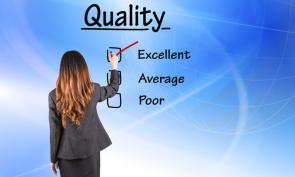I am seriously contemplating leaving my firm and am just beginning the search process. Now we are into ''vacation season,'' and I don't know whether to take my vacation as planned or use the time for potential interviews in the future. And how will it look if I take a vacation and then give notice a few weeks later?

Answer:
First, bravo for planning to take a vacation! In some big firms planning an absence for more than four to five days can be perceived as disloyal or somewhat irresponsible. The topic of how lawyers take or don't take vacations deserves an essay in itself. Read that essay here.
Once, after practicing for three years with very little time off, I planned a 16-day vacation out of the lower 48. I had a hard time with guilt and foreboding as I blocked the time out. As the date approached to take off, my anxiety hit the red zone. It didn't help that the week before my vacation, more than a few of my colleagues stopped by my office to express sorrow that I was leaving the firm.
"I'm not leaving the firm," I said.
"But no one would go away for two weeks unless they planned to quit soon after their return."
"I don't plan to quit."
Their puzzled looks only heightened my fear that I might be shooting myself in the foot. My primary supervising attorney wasn't thrilled. We had a few terse interchanges about deadlines and my current billable-hours status, both of which were under control. By the time I left on vacation, I had resolved that if this vacation cost me my job, it was a bridge I had to cross.
The result was unexpected. Two weeks in the wilderness really cleaned out the cobwebs. It had been more than six years since I had last escaped civilization and seen the world through a broader lens. That time away from the firm sowed seeds of doubt about how I was balancing my time (or not). That overdue vacation actually started me down a path that led to leaving my firm. But it didn't have anything to do with my firm's reaction, just mine.
Surprisingly, when I returned I was greeted with open arms and enthusiasm to "hear all about it," and I was able to pick up fairly easily from where I left off. I smiled to myself when my supervisor planned a vacation to the same spot the following year. And others began to block out time.
One of the named partners used to give a talk once a year that included the importance of taking vacations. We all wanted to believe him, but the competitive atmosphere and the pivotal review periods created an internal culture that equated daily presence and access with loyalty and sacrifice for the firm. Most of us didn't want to risk that impression.
So how do you add a job hunt to a scenario that might already be a little tricky? First, you do what all the books tell you about basic planning. Plan your vacation way ahead of time. Put it in all pertinent shared calendars. Work ahead on deadlines. Anticipate your plan for coverage. You may need different people to cover different things. Have a backup system for your backups. Communicate well with the colleagues and clients you work with on a frequent basis. If you are a litigator and your work demands can suddenly materialize with little notice, have some flexibility in your plans.
Most importantly, adopt the right attitude. While you are speaking to people about your plans for coverage or working late to clear deadlines the weeks before, it doesn't hurt if you have a goofy smile on your face and you communicate your excitement about what you have planned. Guilt and fear and anxiety about taking a vacation can be a communicable disease. Fortunately, a joyous attitude that reflects a balanced dedication to the firm and to taking care of you can also spread from person to person. You are not only taking care of yourself, you may be giving someone else permission by example to care for himself or herself as well.
Assuming you have a well-planned vacation on the books, unless there are exceptional circumstances, I would advise you not to change your plans. A job search is inherently unpredictable, especially in this market. There are no guarantees of interviews or offers. If you do get a request for an interview, you may be able to fold it into your vacation time. Or if a firm wants you to fly cross-country the week you return from vacation, most firms will work to find a time on a Monday or Friday.
Recruiting staff understand schedules and the demands on attorneys. Do keep your recruiter updated on your location. There is nothing more frustrating than to have netted the extremely hard-to-get interview only to find the candidate is out of the country when the key partner is available.
And if you are lucky enough to receive the perfect offer two weeks after you return from vacation, show some sensitivity in negotiating a stop date. Err on the side of helping your old firm even if you may be a bit compromised yourself for a few days. Treat people well, including yourself, and it's more than possible to find a great new job, have a vacation, and leave your old firm in their good graces.
About Harrison Barnes
No legal recruiter in the United States has placed more attorneys at top law firms across every practice area than Harrison Barnes. His unmatched expertise, industry connections, and proven placement strategies have made him the most influential legal career advisor for attorneys seeking success in Big Law, elite boutiques, mid-sized firms, small firms, firms in the largest and smallest markets, and in over 350 separate practice areas.
A Reach Unlike Any Other Legal Recruiter
Most legal recruiters focus only on placing attorneys in large markets or specific practice areas, but Harrison places attorneys at all levels, in all practice areas, and in all locations-from the most prestigious firms in New York, Los Angeles, and Washington, D.C., to small and mid-sized firms in rural markets. Every week, he successfully places attorneys not only in high-demand practice areas like corporate and litigation but also in niche and less commonly recruited areas such as:
- Immigration Law
- Workers Compensation
- Insurance
- Family Law
- Trust and Estate
- Municipal law
- And many more...
This breadth of placements is unheard of in the legal recruiting industry and is a testament to his extraordinary ability to connect attorneys with the right firms, regardless of market size or practice area.
Proven Success at All Levels
With over 25 years of experience, Harrison has successfully placed attorneys at over 1,000 law firms, including:
- Top Am Law 100 firms such including Sullivan and Cromwell, and almost every AmLaw 100 and AmLaw 200 law firm.
- Elite boutique firms with specialized practices
- Mid-sized firms looking to expand their practice areas
- Growing firms in small and rural markets
He has also placed hundreds of law firm partners and has worked on firm and practice area mergers, helping law firms strategically grow their teams.
Unmatched Commitment to Attorney Success - The Story of BCG Attorney Search
Harrison Barnes is not just the most effective legal recruiter in the country, he is also the founder of BCG Attorney Search, a recruiting powerhouse that has helped thousands of attorneys transform their careers. His vision for BCG goes beyond just job placement; it is built on a mission to provide attorneys with opportunities they would never have access to otherwise. Unlike traditional recruiting firms, BCG Attorney Search operates as a career partner, not just a placement service. The firm's unparalleled resources, including a team of over 150 employees, enable it to offer customized job searches, direct outreach to firms, and market intelligence that no other legal recruiting service provides. Attorneys working with Harrison and BCG gain access to hidden opportunities, real-time insights on firm hiring trends, and guidance from a team that truly understands the legal market. You can read more about how BCG Attorney Search revolutionizes legal recruiting here: The Story of BCG Attorney Search and What We Do for You.
The Most Trusted Career Advisor for Attorneys
Harrison's legal career insights are the most widely followed in the profession.
- His articles on BCG Search alone are read by over 150,000 attorneys per month, making his guidance the most sought-after in the legal field. Read his latest insights here.
- He has conducted hundreds of hours of career development webinars, available here: Harrison Barnes Webinar Replays.
- His placement success is unmatched-see examples here: Harrison Barnes' Attorney Placements.
- He has created numerous comprehensive career development courses, including BigLaw Breakthrough, designed to help attorneys land positions at elite law firms.
Submit Your Resume to Work with Harrison Barnes
If you are serious about advancing your legal career and want access to the most sought-after law firm opportunities, Harrison Barnes is the most powerful recruiter to have on your side.
Submit your resume today to start working with him: Submit Resume Here
With an unmatched track record of success, a vast team of over 150 dedicated employees, and a reach into every market and practice area, Harrison Barnes is the recruiter who makes career transformations happen and has the talent and resources behind him to make this happen.
A Relentless Commitment to Attorney Success
Unlike most recruiters who work with only a narrow subset of attorneys, Harrison Barnes works with lawyers at all stages of their careers, from junior associates to senior partners, in every practice area imaginable. His placements are not limited to only those with "elite" credentials-he has helped thousands of attorneys, including those who thought it was impossible to move firms, find their next great opportunity.
Harrison's work is backed by a team of over 150 professionals who work around the clock to uncover hidden job opportunities at law firms across the country. His team:
- Finds and creates job openings that aren't publicly listed, giving attorneys access to exclusive opportunities.
- Works closely with candidates to ensure their resumes and applications stand out.
- Provides ongoing guidance and career coaching to help attorneys navigate interviews, negotiations, and transitions successfully.
This level of dedicated support is unmatched in the legal recruiting industry.
A Legal Recruiter Who Changes Lives
Harrison believes that every attorney-no matter their background, law school, or previous experience-has the potential to find success in the right law firm environment. Many attorneys come to him feeling stuck in their careers, underpaid, or unsure of their next steps. Through his unique ability to identify the right opportunities, he helps attorneys transform their careers in ways they never thought possible.
He has worked with:
- Attorneys making below-market salaries who went on to double or triple their earnings at new firms.
- Senior attorneys who believed they were "too experienced" to make a move and found better roles with firms eager for their expertise.
- Attorneys in small or remote markets who assumed they had no options-only to be placed at strong firms they never knew existed.
- Partners looking for a better platform or more autonomy who successfully transitioned to firms where they could grow their practice.
For attorneys who think their options are limited, Harrison Barnes has proven time and time again that opportunities exist-often in places they never expected.
Submit Your Resume Today - Start Your Career Transformation
If you want to explore new career opportunities, Harrison Barnes and BCG Attorney Search are your best resources. Whether you are looking for a BigLaw position, a boutique firm, or a move to a better work environment, Harrison's expertise will help you take control of your future.
Submit Your Resume Here to get started with Harrison Barnes today.
Harrison's reach, experience, and proven results make him the best legal recruiter in the industry. Don't settle for an average recruiter-work with the one who has changed the careers of thousands of attorneys and can do the same for you.
About BCG Attorney Search
BCG Attorney Search matches attorneys and law firms with unparalleled expertise and drive, while achieving results. Known globally for its success in locating and placing attorneys in law firms of all sizes, BCG Attorney Search has placed thousands of attorneys in law firms in thousands of different law firms around the country. Unlike other legal placement firms, BCG Attorney Search brings massive resources of over 150 employees to its placement efforts locating positions and opportunities its competitors simply cannot. Every legal recruiter at BCG Attorney Search is a former successful attorney who attended a top law school, worked in top law firms and brought massive drive and commitment to their work. BCG Attorney Search legal recruiters take your legal career seriously and understand attorneys. For more information, please visit www.BCGSearch.com.
Harrison Barnes does a weekly free webinar with live Q&A for attorneys and law students each Wednesday at 10:00 am PST. You can attend anonymously and ask questions about your career, this article, or any other legal career-related topics. You can sign up for the weekly webinar here: Register on Zoom
Harrison also does a weekly free webinar with live Q&A for law firms, companies, and others who hire attorneys each Wednesday at 10:00 am PST. You can sign up for the weekly webinar here: Register on Zoom
You can browse a list of past webinars here: Webinar Replays
You can also listen to Harrison Barnes Podcasts here: Attorney Career Advice Podcasts
You can also read Harrison Barnes' articles and books here: Harrison's Perspectives
Harrison Barnes is the legal profession's mentor and may be the only person in your legal career who will tell you why you are not reaching your full potential and what you really need to do to grow as an attorney--regardless of how much it hurts. If you prefer truth to stagnation, growth to comfort, and actionable ideas instead of fluffy concepts, you and Harrison will get along just fine. If, however, you want to stay where you are, talk about your past successes, and feel comfortable, Harrison is not for you.
Truly great mentors are like parents, doctors, therapists, spiritual figures, and others because in order to help you they need to expose you to pain and expose your weaknesses. But suppose you act on the advice and pain created by a mentor. In that case, you will become better: a better attorney, better employees, a better boss, know where you are going, and appreciate where you have been--you will hopefully also become a happier and better person. As you learn from Harrison, he hopes he will become your mentor.
To read more career and life advice articles visit Harrison's personal blog.





